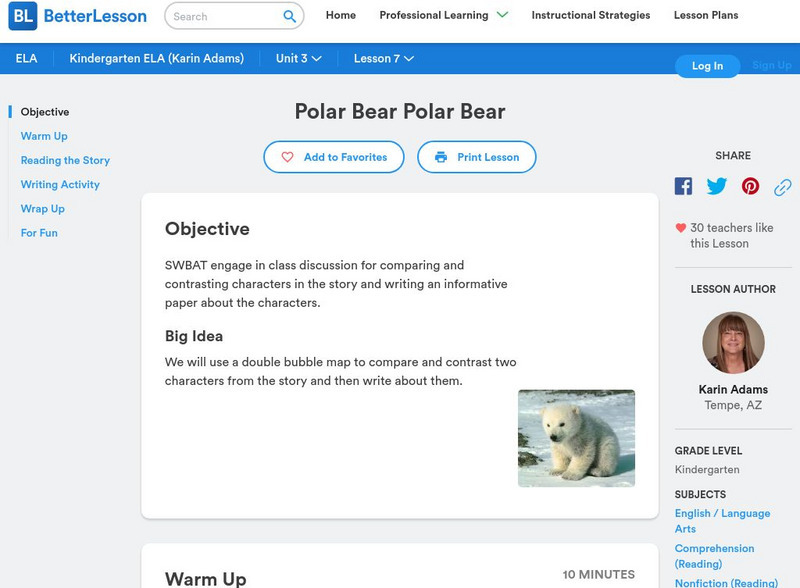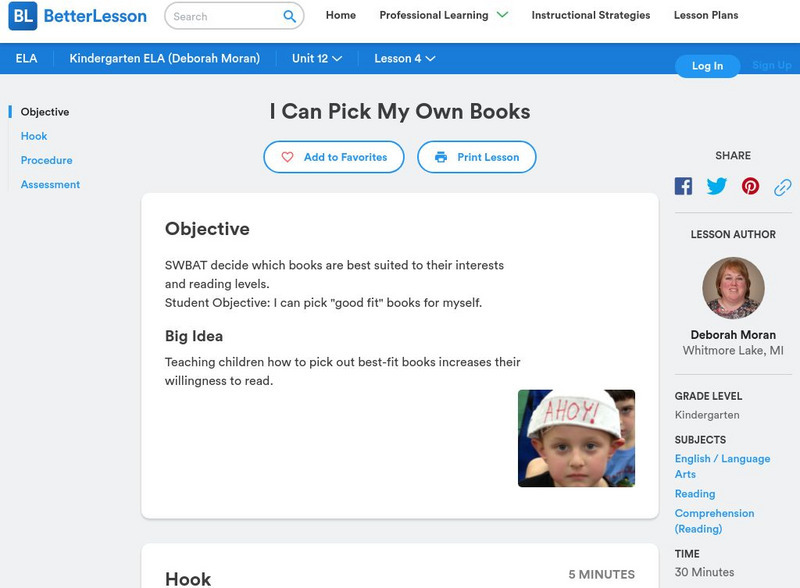Better Lesson
Better Lesson: Getting to Know Cendrillion
When students think of Cinderella, they usually think of the Disney version. In this lesson, 1st graders will learn about the Mexican fairy tale for Cinderella, Cendrillion.
Better Lesson
Better Lesson: Is the Statement True or False?
Second graders use their knowledge of place value to determine whether a comparison statement is true or false.
Better Lesson
Better Lesson: Using Different Units to Measure Day 2
First graders continue to measure floor strips with a choice of three different units.
Better Lesson
Better Lesson: Using Different Units to Measure Day 1
Today students will focus on the idea that measuring an object using different length units will result in different measurements.
Better Lesson
Better Lesson: Measuring With Student Steps
Bill Murray called it "Baby Stepping" but today we will be student stepping. The students will measure 8 different lines using their own feet!
Better Lesson
Better Lesson: Assessing Measurement Techniques
Today you will get an opportunity to conduct an assessment interview that will look at how well your students are measuring with inch tiles.
Better Lesson
Better Lesson: Keeper or Not a Keeper?
First graders measure fish to determine if the fish is a keeper or not a keeper. In doing so, they also tackle rigorous measurement questions!
Better Lesson
Better Lesson: Polar Bear Polar Bear
In this lesson plan, students will use a double bubble map to compare and contrast two characters from the story "Polar Bear, Polar Bear, What Do You Hear?" by Bill Martin, Jr.
Better Lesson
Better Lesson: The Big Yellow Bus
For this lesson, students will talk about two characters from The Big Yellow Bus. Students will compare and contrast these characters. Then students write about what is similar and different.
Better Lesson
Better Lesson: What's Up With All the Sheep?
In this instructional activity, students will compare and contrast several nursery rhymes related to sheep.
Better Lesson
Better Lesson: Franklin in the Dark
In this lesson, students will listen to the story "Franklin in the Dark" by Paulette Bourgeois. Then students will compare and contrast its two characters and write about them.
Better Lesson
Better Lesson: I Can Pick My Own Books
Teaching children how to pick out best-fit books increases their willingness to read.
Better Lesson
Better Lesson: Patterns in Larger Numbers
Patterns are everywhere. We can use patterns to help us deal with larger numbers
Better Lesson
Better Lesson: Larger Number Patterns
Second graders can find patterns in 4-digit numbers that will help them when counting over decades and centuries.
Better Lesson
Better Lesson: Pets, Pets and More Pets
Second graders love to talk about pets and in this lesson they can share how many pets they have.
Better Lesson
Better Lesson: Larger Numbers: A Tie to Social Studies
I want my students to realize that numbers are everywhere and math is applicable to almost all other subjects. Geography offers a perfect opportunity for students to make this connection.
Better Lesson
Better Lesson: Writing and Solving Number Stories
We can apply math to almost every part of the day and make math have a purpose for students.
Better Lesson
Better Lesson: Patterns in Nature
Are there patterns in nature that can be described by numbers? That is what we will find out here.
Better Lesson
Better Lesson: Trimester Assessment Day
It is important to assess understandings of concepts that students have worked on before moving ahead with new concepts or higher level thinking.
Better Lesson
Better Lesson: Let's Review
Revisit, Revisit, Revisit! Students need repeated exposure to math concepts to really understand how they work.
Better Lesson
Better Lesson: Using a Pattern to Solve a Problem
Patterns are prevalent in all levels of math. Common Core Standards expect students to be able to use structure - like that found in repeating the patterns of odd and even numbers or counting by 5s or 10s - to solve problems (MP7).
Better Lesson
Better Lesson: Moving Into Thousands
To make sense of numbers in the thousands, 2nd grade students need practice identifying place value positions and using place value strategies in numbers to 1,000.
Better Lesson
Better Lesson: Unit 3 Assessment
It is important to assess students periodically to plan for future lessons to meet student needs.
Better Lesson
Better Lesson: Time and Money
As the result of a Unit assessment, it was found that students showed some confusion with writing time and with adding sets of coins. These skills need to be reviewed to aid in mastery of the Common Core standards for time and money.








